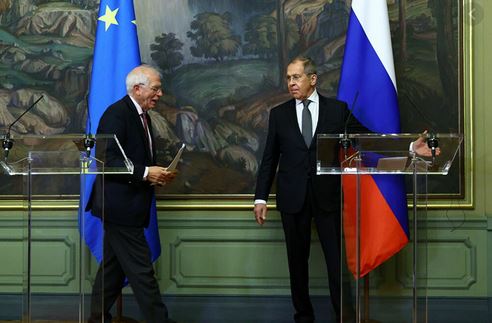Blame for EU-Russia Impasse
By Finian Cunningham

February 16, 2021 "Information
Clearing House" - There’s
nothing like a good dose of truth to get
some people’s hackles up. Russian Foreign
Minister Sergei Lavrov told the European
Union it was “an unreliable partner” and
then the floodgates of fury opened.
Lavrov was speaking to the European
Union’s foreign affairs chief Josep Borrell
while he was on an official visit to Moscow.
It was a fair comment by the Russian top
diplomat considering the facts of Europe’s
servile deference to Washington’s
anti-Russia policies, as well as the EU’s
arrogant assumption to interfere in Russia’s
sovereign affairs.
But the furious reaction to Lavrov’s
remark alleged that Russia was “humiliating”
the EU. The bloc is threatening to impose
more sanctions on Moscow, to which the
Kremlin has said it is ready to sever
relations with the EU if it goes ahead with
moves to damage the Russian economy.
Lamentably, Russia and the EU should be
natural partners. After all, Russia is the
largest country on the continent of Europe
and there is huge trade flows between them,
especially in the critical energy sector of
Russian oil and gas.
However, since the EU enlarged its
membership over many preceding years to the
current number of 27 states, it can be
adjudged to have acquired a more
complicated, incoherent and feckless policy
towards Russia. A major factor has been the
membership of Poland and the Baltic states
of Estonia, Lithuania and Latvia. Those
states joined the EU in 2004 along with six
others in what was the biggest expansion
episode for the bloc.
Poland and the Baltic states are
characterized by politics of intense
animosity towards Russia, or what may be
called Russophobia. The history of the
Soviet Union, their collaboration with Nazi
Germany, and the Red Army’s liberation of
quisling states all contribute to a dominant
reactionary politics in Poland and the
Baltic countries. One which is marked by
resentment and contempt for Russia.
No Advertising - No Government
Grants - This Is Independent Media
t is notable that when Josep Borrell returned
from his recent trip to Moscow it was mainly
politicians from the above states who led the calls
for his resignation and the imposition of more
sanctions on Russia.
It is these countries which have pushed a whole
host of anti-Russia viewpoints, including claims
that Moscow has nefarious plans for aggression and
posing as an imminent security threat. Washington
has taken full advantage of this Russophobia to
increase its influence over Europe. Poland and the
Baltic states are big proponents of NATO force
build-up along Russia’s borders. They also are
vehemently opposed to further development of Russian
gas supplies through the Nord Stream 2 project while
touting for American alternative Liquefied Natural
Gas, even though the latter would be much more
expensive for consumers, industry and businesses.
The irrational antagonism towards Russia is such
that politicians from Poland and the Baltic states
are even opposed to the EU registering the use of
the Sputnik V vaccine despite its proven efficacy
and the outstanding supply problems for vaccinating
the EU population. This obdurate mindset is
tantamount to cutting your nose off to spite your
face.
Mick Wallace, an Irish independent Member
of the European Parliament, says the Polish and
Baltic politicians are “obsessed” with spouting
negative views about Russia. He says though that
their influence on European policy is “zero” since
France and Germany are the main drivers of policy.
Nevertheless, they are an irritant in relations with
Russia.
Historically, Wallace says the EU admitted those
Eastern European states to its ranks for two
reasons: to boost European corporate profits by
accessing a pool of cheap labour; and, two, to
facilitate the expansion of NATO and the
all-important military-industrial complex.
But a “price” for these purported gains was the
detriment it would produce for European-Russian
relations.
This is reflected in European hypocrisy and
duplicity. On the one hand, the EU needs Russia for
fueling its societies and economies. On the other
hand, anti-Russian bigotry and prejudices are given
vent from reactionary, rightwing member states.
Moscow is right to tell the duplicitous Europeans
they are unreliable.
Because they are. Reliably unreliable. It is not
Russia which is seeking to sever relations. It is
the European Union which has constantly undermined
and thwarted relations. It takes two to tango.
And understandably Russia has got fed up with
being constantly tripped by EU duplicity.
Finian
Cunningham
has written extensively on international
affairs, with articles published in several
languages. He is a Master’s graduate in
Agricultural Chemistry and worked as a
scientific editor for the Royal Society of
Chemistry, Cambridge, England, before pursuing a
career in newspaper journalism. He is also a
musician and songwriter. For nearly 20 years, he
worked as an editor and writer in major news
media organisations, including The Mirror, Irish
Times and Independent. - -
"Source"
-